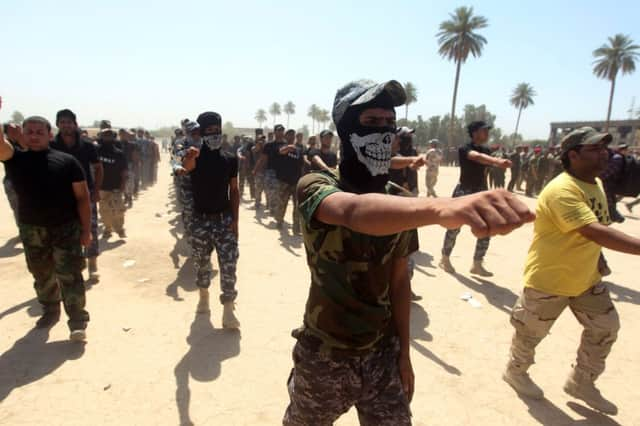Sectarian war fears grow after 50 bodies found


The rise of insurgents over much of northern and western Iraq during the past month has increased tensions between the Shiite majority and Sunni minority. At the same time, splits have grown between the Shiite-led government in Baghdad and the Kurdish region in the north.
In an address yesterday, prime minister Nouri al-Maliki accused the Kurdish zone of being a haven for the Islamic extremists and other Sunni insurgents.
Advertisement
Hide AdAdvertisement
Hide AdHe did not provide any evidence, and the claims are likely to only further strain Baghdad’s ties which the Kurds, whose fighters have been battling the militant advance in the north.
The bodies, all of them with gunshot wounds, were found in the predominantly Shiite village of Khamissiya outside the city of Hillah, located 60 miles south of Baghdad, said a military spokesman.
The dead were men between the ages of 25 and 40, and it appeared they had been killed days earlier and then dumped in the remote area, said a police officer and a medical official.
The area south of Hillah is predominantly Shiite, but there is a belt of Sunni majority towns north of the city.
While the motives remain unclear, such grisly killings harken back to the worst days of Iraq’s sectarian bloodletting in 2006 and 2007. At that time, with a Sunni insurgency raging, Shiite militias and Sunni militant groups were notorious for slayings of members of the other sect, and bodies were frequently dumped along roadsides, in empty lots, ditches and canals. As the levels of violence dropped over time, such discoveries became rare.
However, sectarian tensions have soared once more, and authorities have once again begun to find unidentified bodies since the Sunni militant offensive that swept across much of northern and western Iraq over the past month.
The militant surge is led by the Islamic State extremist group, but other Sunni insurgents have joined, feeding off anger in their minority community against the Shiite-led government. On the other side, Shiite militias have rallied around Mr Maliki’s government to fight back against the militant advance.
In the far north, meanwhile, Iraq’s Kurds have taken advantage of the mayhem in the country to seize disputed territory – including the city of Kirkuk, a major oil centre – and move closer to a long-held dream of their own state.
Advertisement
Hide AdAdvertisement
Hide AdKurdish fighters, known as peshmerga, say they want to protect the areas from the Sunni militants.
Many of the areas have significant Kurdish populations that the Kurds have demanded for years be incorporated into their territory, making them unlikely to give them up.
These moves have infuriated Mr Maliki, who is under pressure from opponents as well as former allies to step down.
He lashed out at the Kurds in his weekly televised statement yesterday, saying “everything that has been changed on the ground must be returned” – a clear reference to the disputed territory that fighters loyal to the Kurdish regional government, which is based in the city of Irbil, have taken.
Shiite-dominated Iran, a close ally of Mr Maliki, has been aiding Iraq’s military – help that is believed to include advisers.